Appendicitis is a condition where the appendix becomes swollen and infected. It affects about 5% of the population across the globe. Appendicitis can be caused by a blockage within the appendix, which causes blood flow issues, inflammation, infection and pressure. The appendix can rupture if not treated in time1. The pain caused by appendicitis should not be ignored, as a delay in seeking medical help can lead to the bursting of the appendix, which is a life-threatening complication of appendicitis. Home remedies are of no help in treating this condition. However, you may follow some home remedies for a smooth recovery after an Appendicectomy ( a surgical procedure to remove the appendix).
The appendix is a small finger-shaped organ connected to the large intestine on the right side of the abdomen. Its exact function is unknown, and it is possible to live without one. Appendicitis is a condition that causes the appendix to swell, become inflamed and fill with pus. This can result in a lot of discomfort. Appendicitis can occur at any age, but it is most common in people in their teens and twenties. An inflamed appendix can cause slow and dull pain in the abdomen. If left untreated, a ruptured appendix can spread bacteria throughout the abdominal cavity. These bacteria cause peritonitis, a potentially fatal infection that can result in death.
The most common symptom of appendicitis is abdominal pain that begins near the belly button, progressing lower and to the right. Other symptoms may include2:
Appendicitis in children may generally not show typical symptoms. A person may also have a frequent and urgent need to urinate, though this is extremely uncommon. Anyone experiencing progressively worsening abdominal pain should seek medical attention. Symptoms of other conditions, such as a urinary tract infection, may be similar. Nonetheless, all of these conditions necessitate immediate medical attention to avoid any fatal complications.
The exact cause of appendicitis is unknown in many cases. It is believed to develop when a section of the appendix becomes obstructed or blocked. Many things can obstruct your appendix, including:
Anyone can get appendicitis. However, some people may be more prone to developing this condition than others. Appendicitis risk factors include:
Appendicitis can lead to serious complications if your appendix ruptures, allowing faeces and bacteria to enter your abdominal cavity. A ruptured appendix can cause a variety of painful and potentially fatal infections, including:
To manage and prevent complications, it is best to speak to a healthcare specialist.
Appendicitis starts with a dull pain in the abdominal cavity and then wreaks havoc on the whole body as days pass. Consult a doctor and follow the treatment advised. You will most likely have to undergo immediate surgery. Appendix surgeries are safe, and your doctor will recommend medicines, rest and a proper diet that will help you recover fast after the surgery. Adhere to your doctor’s instructions and you can also discuss with them about following a list of home remedies that have been shown to be effective for patients recovering from appendix surgery.

It may take some time to return to your pre-appendicectomy diet. Eating smaller portions more frequently, such as 6 to 8 small meals throughout the day, can aid in the gradual return to the regular diet. It is critical to drink plenty of water and caffeine-free fluids after an appendectomy to avoid constipation and bowel problems. Include foods that contain bromelain, an enzyme that aids in pain relief and wound healing3. Zinc deficiency in the diet can interfere with the body’s natural healing mechanism. Choose food that is healthy and easy to digest.
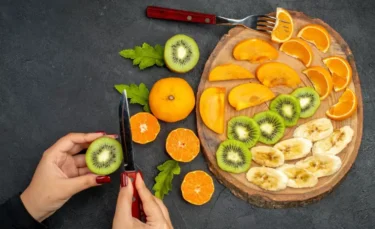
Clinical studies4 have shown that vitamin C plays an important role in all aspects of wound healing, from neutrophil clearance to scab formation. To ensure a speedy recovery from internal wounds, a vitamin C-rich diet is essential. The highest sources of ascorbic acid or vitamin C are amlas, strawberries, limes, kiwi fruits, red capsicum, guavas, oranges, grapefruit and cauliflower.
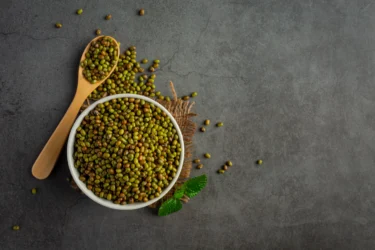
Mung beans or green grams contain antibacterial agents, which make them an ideal post-surgery recovery food. They are regarded as stomach-cooling food. Doctors and practitioners recommend eating one tablespoon of rinsed and soaked green gram every day, either raw, steamed or lightly microwaved. For best results, consume it three times per day.

Rest is essential after appendix surgery, but so is light activity. When you’re ready, gradually increase your activity level. Short walks, even around the house, are a great place to start and can help prevent pneumonia and blood clots. An added benefit is that being active encourages your digestive system to return to normalcy sooner. Constipation can be excruciating, so include some doctor-approved exercise in your daily routine, drink plenty of fluids and take stool softeners if your doctor recommends them.
Although appendicitis is usually confused with regular abdominal pain, consulting a physician for physical examination, undergoing imaging tests like ultrasound and CT scan in case of severe and persistent sudden abdominal pain is crucial.
Dr. Ashish Bajaj, M.B.B.S. M.D. in Clinical Pharmacology and Toxicology.

If you recently had an appendectomy, you will most likely be in bed for an extended period of time. Before attempting any exercises while in bed, consult your doctor. If your doctor approves, begin with simple leg pumps and lifts to improve blood flow and circulation in the lower parts of your body. Furthermore, performing bed exercises can help reduce the likelihood of blood clots forming in your lower extremities. Perform these exercises every hour while lying in bed.

After a few weeks of rest, begin gentle walking and avoid strengthening exercises. Begin by sitting on the edge of a bed with your feet hanging off the edge. Lift your legs up until they are parallel to the floor, keeping your back straight and core tight. Hold for a few seconds before slowly lowering your legs back to their original position. Repeat until you’re exhausted.
Also Read: Natural Home Remedies For Vomiting
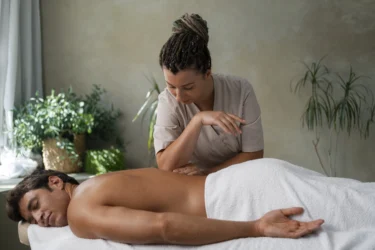
A person may experience severe pain following surgery. Massage alleviates acute pain by promoting recovery and relieving tension. It causes friction between the skin and the fingers, which increases blood flow to the area. A post-appendectomy massage at home can be very relaxing and help to relieve tension. Make sure you consult your doctor about the recovery and get a massage once allowed.

When a person undergoes surgery, the body’s natural response is to halt normal activity so that it can focus on uninterrupted healing. That means you’ll be sleeping a lot more than usual for at least the first week or so after surgery. This period of reduced physical activity is critical, especially after abdominal surgery, either open or laparoscopic. This is because your surgeon had to cut through the visible external muscles and the innermost layer of the abdominal wall, which holds your internal organs in place. If you resume your normal activities before the inner layer has healed, you may develop a hernia, in which part of your intestine squeezes out of the abdominal cavity.
Appendicitis is a serious condition and a surgery might be needed as soon as possible. The post-surgery recovery stage is equally important as the body needs to heal itself. During this period, make sure that you get plenty of rest, eat well and slowly incorporate your daily activities back into your life.
Also Read: 10 Effective Home Remedies for Irregular Periods
If the abdominal pain is due to appendicitis, you should never rely on home remedies, as there are high chances that it might burst and can cause complications. Seek immediate care from a general surgeon to prevent complications.
Dr. Nikhil Yadav, MBBS MD,CCEBDM
Also Read: Natural Home Remedies For Stomach Ulcers
Appendicitis can be caused by infections in your digestive tract, such as viruses, bacteria or parasites. It could also happen if the tube connecting your large intestine and appendix becomes blocked or trapped by stool or worms. Tumours can occasionally cause appendicitis. The appendix becomes painful and swollen as a result.
Appendicitis usually begins with a pain in the middle of your stomach (abdomen) that comes and goes. Within hours, the pain spreads to the lower right side of the abdomen, where the appendix is usually found and becomes constant and severe. Pressing on this area, coughing or walking may aggravate the pain.
Some of the fruit seeds consumed are naturally excreted from the body, while others can cause appendicitis. Appendicitis has been linked to the seeds of vegetables and fruits such as cacao, orange, melon, barley, oat, fig, grape, date, cumin and nut.
Surgery to remove the appendix is the standard treatment for appendicitis. This procedure is known as an Appendicectomy. Antibiotics are sometimes used while the diagnosis is being made, but most doctors agree that antibiotics cannot cure appendicitis.
Disclaimer: The information provided here is for educational/awareness purposes only and is not intended to be a substitute for medical treatment by a healthcare professional and should not be relied upon to diagnose or treat any medical condition. The reader should consult a registered medical practitioner to determine the appropriateness of the information and before consuming any medication. PharmEasy does not provide any guarantee or warranty (express or implied) regarding the accuracy, adequacy, completeness, legality, reliability or usefulness of the information; and disclaims any liability arising thereof.
Do the heels of your feet crack often? Does it feel like your heels are always cracking at the smallest inconvenience, and it is pretty challenging to maintain them? Don’t worry we’ve got all the information you’ll need about them that can help. Your heels might be cracking due to a number of different reasons, the dry climate being one. Cracked heels are also referred to as heel fissures. It can be a simple cosmetic problem that feels like a nuance but can lead to serious medical problems as well. Cracked heels are a common problem faced by many individuals; it is also known as xerosis or dry skin. When the skin around the rim of the heel thickens, it is known as a callus. The symptoms of a cracked heel might be worse if a callus is formed1.
Drying of the heel, leading to its cracking, can be caused by multiple reasons. Some of the factors that cause cracked heels are:
A cracked heel is a symptom and can occur due to various reasons, as stated above. Some of the features of a cracked heel that will help you identify it are:
You can try natural ingredients to care for your heels and get smooth heels. A few home remedies for cracked heels that you can try are listed below. You can try a few of these home remedies, which might be the solution to your question of ‘how to get rid of cracked heels?
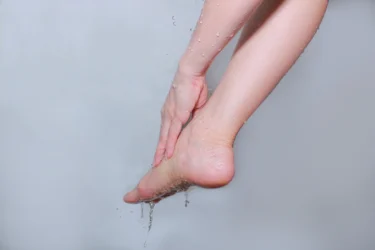
This is a pretty straightforward remedy and might just be what you need. It might seem like a small thing, but it can make a world of difference if done correctly. Make sure that you wash your feet with water that’s not too hot or too cold. Use lukewarm water and mild soap to wash your feet. This can prove to be a good home remedy for a cracked heel. While it’s alright to soak your feet in water for a few minutes before washing them, make sure not to scrub your feet. Soaking feet in water for too long risks weakening the skin barrier, resulting in excessive moisture loss2.

You should moisturize your skin after you wash and dry them properly. You can use mild lotions and creams and apply them generously to your skin and feet. It takes a few minutes for the moisturizer to seep into your skin. So after a few minutes, you should apply a sealant cream or occlusive ointment that seals the moisture in2.
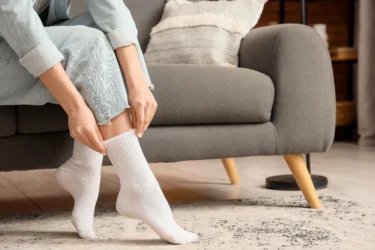
There is another way that can help you seal the moisture into your feet, i.e. wearing socks. Wearing socks to bed, right after you wash your feet, moisturize and lock the moisture in, can be a good idea. Even if you’re not interested in wearing socks throughout the day, you can try wearing socks to bed. It can be beneficial for your cracked heel. Wearing cotton socks helps in locking the moisture better and might be one of the easiest home remedies for cracked heels to follow2.
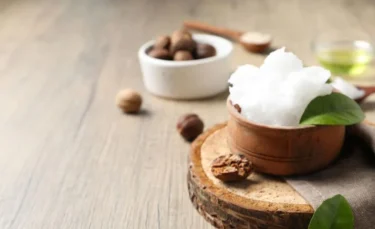
Shea butter can be beneficial in healing cracked heels. It is used in body lotions and creams. It has the property of softening and moisturizing the skin. Shea butter is obtained from the nut of the African Shea tree. It has been recommended for soothing dry skin caused by dermatitis (inflammation of the skin). It is also recommended as a moisturizer for hands and feet3. Therefore, it can be used as one of the home remedies for the cracked heel as well. You can apply it directly onto your cracked heel, or you can dilute it with an oil of your choice before applying it.
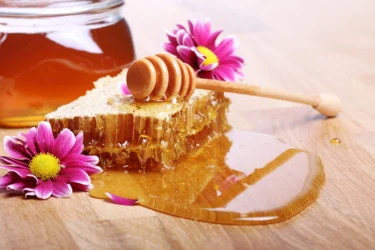
Honey is one ingredient that can be easily found in kitchens across the world. It is being used traditionally to manage multiple skin conditions, cuts and wounds as well. In studies, it was found that honey can also be used to manage skin conditions that can be caused due to faults in the immune system, like atopic dermatitis and contact dermatitis4. Therefore, it can also be used as a home remedy for dealing with cracked heels. To use honey, you can directly apply it to your feet, keep it for a few minutes and wash it off. You can also mix a little bit of rice flour and lemon juice with honey and apply it as a pack to your cracked heels. Washing it off with water might give you smooth heels, and it might prove to be the home remedy that you’ve been looking for.
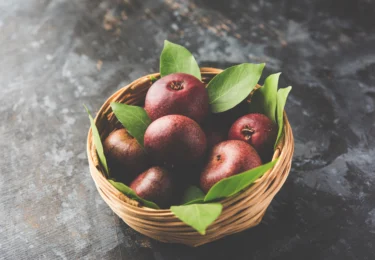
The seed of kokum is used to obtain kokum butter. Kokum butter is widely used for making soaps and lotions. It has the property of moisturizing the skin and is used for managing fissures and extremely dry skin. It can be used as a moisturizer for hands and feet5. Therefore, it can be used for healing cracked heels. You can make use of kokum butter directly or use an oil of your choice to dilute it and apply it to your feet as one of the home remedies for cracked heels. You can moisturize your feet with kokum butter and then wear cotton socks to get more benefits.
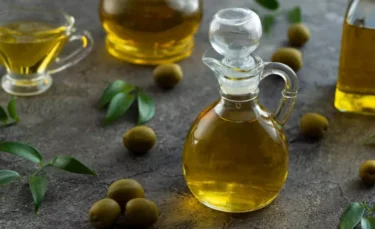
Olive oil can also prove to be helpful in healing cracked heels. It is known to have properties such as acceleration of tissue repair and facilitation of removal of dead skin6. Therefore, olive oil can be used for application on foot. Direct application of olive oil can be helpful. You can also mix olive oil along with sesame oil and honey for beneficial effects. As this cracked heel remedy combines more than one of the ingredients that help in managing heel cracks, it might be one of the best remedies for cracked heels.

Coconut oil is obtained from the pulp of coconut. It has been extensively used as a moisturizer for mild to moderately dry skin. Thus, it can also be used for cracked heels. It is mineral oil and is safe to use. Coconut oil, especially virgin coconut oil, promotes faster growth of new skin cells, thus promoting the healing of wounds6. You can apply either coconut oil or virgin coconut oil onto your heels as a home remedy for a cracked heel.
If you have tried taking care of your cracked heels and they still do not get better, then you should visit a dermatologist (skin and hair doctor). A dermatologist will thoroughly examine your feet to find the root of the problem. If you are already aware that you have an underlying medical condition like diabetes, then you should definitely consult your doctor for skin dryness, especially dryness of the feet. So, make an appointment and get your heels checked if self-care doesn’t lead to improvement of your heel cracks2.
Heels can be difficult to maintain, especially if you live in a dry climate, as they tend to crack. There might be other reasons like nutritional deficiencies, diabetes or atopic dermatitis, due to which there may be cracked heels. When your feet get dry, the borders and bottom of your feet may feel hardened and flaky. These signs of cracked skin can soon disappear if you take good care of them just by washing, moisturising and wearing socks. You can try a few home remedies for cracked heels like shea butter, coconut oil, olive oil and honey to get smooth heels. However, if these self-care options do not work for you, you should visit a doctor and seek their advice.
Yes, feet can crack due to dry weather. Cracked heels can also occur if you do not take proper care of your feet or as a result of age changes2.
Yes, you can wear cotton socks after washing and moisturising your feet to lock in the moisture and prevent heels from cracking. It acts as a home remedy for cracked heels2.
Yes, coconut oil is good for healing cracked heels. It is used as a moisturiser for dry skin. You can use coconut oil directly on the cracked heels as a home remedy6.
Yes, shea butter is good for healing cracked feet. It is used for moisturising hands and feet3. You can use it directly or dilute it in oil to use it as a remedy for the cracked heel.
No. Feet should not be washed with water that is too hot or too cold. You should use lukewarm water to wash your feet. You should not soak them in water for too long or scrub them. Use only mild soaps to wash cracked heels2.
1. Heel Fissures [Internet]. Vikaspedia. [cited 2022 May 31]. p. 2019. Available from: https://vikaspedia.in/health/diseases/skin-diseases/heel-fissures
2. How To Heal Your Cracked Heels [Internet]. Cleaveland Clinic. 2022 [cited 2022 May 31]. Available from: https://health.clevelandclinic.org/dont-let-dry-heels-ruin-sandal-season/
3. Israel MO. Effects of Topical and Dietary Use of Shea Butter on Animals. Am J Life Sci [Internet]. 2014;2(5):303. Available from: http://www.sciencepublishinggroup.com/journal/paperinfo.aspx?journalid=118&doi=10.11648/j.ajls.20140205.18
4. McLoone P, Oluwadun A, Warnock M, Fyfe L. Honey: A Therapeutic Agent for Disorders of the Skin. Cent Asian J Glob Heal [Internet]. 2016;5(1). Available from: https://www.ncbi.nlm.nih.gov/pmc/articles/PMC5661189/pdf/cajgh-05-241.pdf
5. Chate MR, Kakade SB, Neeha VS. Kokum (Garcinia indica) Fruit: A Review. Asian J Dairy Food Res [Internet]. 2019;38(04):329–32. Available from: https://www.researchgate.net/publication/340640816_Kokum_Garcinia_indica_Fruit_A_Review
6. Lin TK, Zhong L, Santiago JL. Anti-inflammatory and skin barrier repair effects of topical application of some plant oils. Int J Mol Sci [Internet]. 2018;19(1). Available from: https://www.ncbi.nlm.nih.gov/pmc/articles/PMC5796020/
Disclaimer: The information provided here is for educational/awareness purposes only and is not intended to be a substitute for medical treatment by a healthcare professional and should not be relied upon to diagnose or treat any medical condition. The reader should consult a registered medical practitioner to determine the appropriateness of the information and before consuming any medication. PharmEasy does not provide any guarantee or warranty (express or implied) regarding the accuracy, adequacy, completeness, legality, reliability or usefulness of the information; and disclaims any liability arising thereof.
Links and product recommendations in the information provided here are advertisements of third-party products available on the website. PharmEasy does not make any representation on the accuracy or suitability of such products/services. Advertisements do not influence the editorial decisions or content. The information in this blog is subject to change without notice. The authors and administrators reserve the right to modify, add, or remove content without notification. It is your responsibility to review this disclaimer regularly for any changes.
You might feel pressure on your face and think that it is just because of a cold or allergies that you’ve got. But, along with that, you might feel heaviness in your forehead and between the eyes. It might not be just because of the cold. It might be due to a condition called sinusitis. Sinusitis is the most common sinus problem. When the spaces in our head (sinuses) that are usually filled with air get filled with fluid, it is called sinusitis. This is also known as rhinosinusitis, where rhino means nose. Swelling of the sinuses almost always implies a swelling in nose tissue as well, hence the name1. Let’s find out more about what can cause this condition and how we can use natural remedies to get relief from it.
Blocking of air-filled spaces (sinuses) of the head with fluid due to swelling in its tissue lining is what causes sinus problems or sinusitis. The swelling can be caused by bacteria, fungi, or viruses1. Specific conditions in which this can occur are:
The key to the treatment of sinusitis is to reduce the triggers. Patients should be urged to quit smoking. In addition, the early empirical use of antibiotics should be avoided. The outcomes depend on the cause, but irrespective of treatment, recurrences are common and lead to poor quality of life.
Dr. M.G. Kartheeka, MBBS, MD(Pediatrics)
You might find it difficult to differentiate a sinus problem from a common cold and allergies1. Here are a few common symptoms of sinusitis:
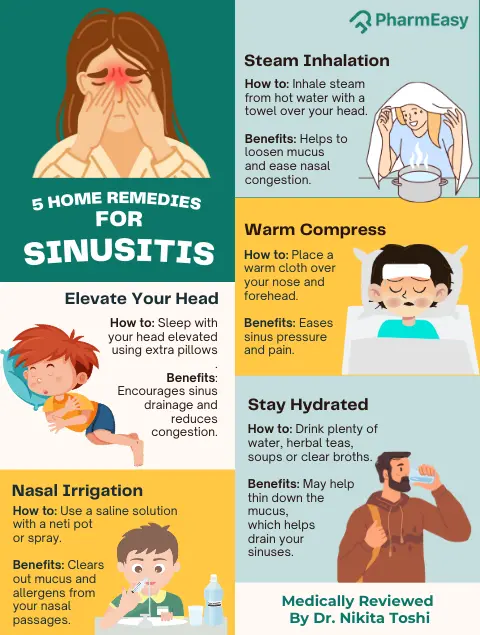
If you’ve had sinusitis, you know how it feels. There is pressure between the eyes and forehead, headache, and a blocked nose1. It can be pretty inconvenient and can cause a lot of discomforts. However, there are a few natural home remedies listed below that you can try to rid yourself of these symptoms.
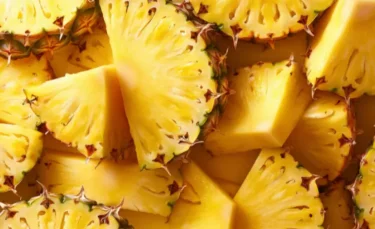
Pineapples have many benefits for sinusitis. The clinical trial findings show that pineapples can help relieve the inflammation of nose mucosa, alleviate breathing difficulty, and lower nasal discomfort. All of these properties are beneficial in managing the symptoms of sinusitis2. Therefore, you can use pineapples as a home remedy just by eating them as a fruit or drinking it as fruit juice.
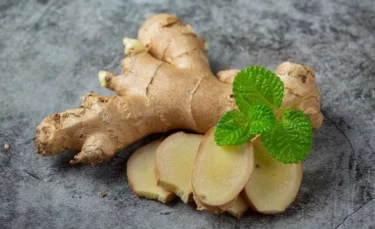
Ginger has the properties of alleviating inflammation and acting as an antioxidant. This might be responsible for its benefits for sinus problems. Ginger, along with green tea, can be highly beneficial for allergies and sinusitis as it suppresses inflammation2. Therefore, you can add ginger to your green tea and drink it to reap its benefits.
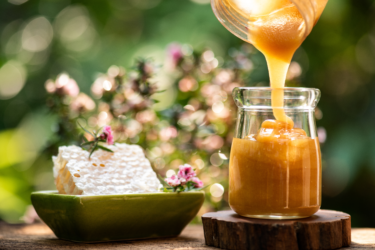
Manuka honey is a different kind of honey that is obtained from the flowers of the species Leptospermum (tea tree). These tea tree flowers are native to Australia and New Zealand. Manuka honey has potential activity against bacteria, especially Pseudomonas aeruginosa and Staphylococcus aureus2. Therefore, it might help manage rhinosinusitis. You can use Manuka honey by mixing it in warm water and drinking it as tea.
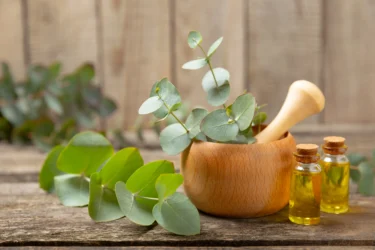
Cineole is a common derivative of eucalyptus oil. It is present in many plant-based essential oils and has various therapeutic effects. It stops inflammation, increases the clearance of the mucous lining of the nose, and reduces pain as well. In addition, it might help alleviate the symptoms of sinusitis2. You can make use of cineole which is present in many oils, and apply it to your forehead, nose, and ears. You can also add a few drops of the oil to warm water and drink it.
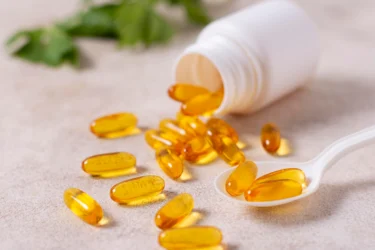
In a study, cod liver oil as a treatment option for rhinosinusitis was studied, and the results were positive. Most of the participants of the study showed improvement in the symptoms of sinusitis and a decrease in the number of hospital visits as well2. However, there is a need for more studies in this area as there is limited research showing the efficiency of cod liver oil for sinusitis. You can use fish liver oil or cod liver oil found in the markets in liquid form and use it for cooking or mixing a little bit of it in water or milk and drinking it.
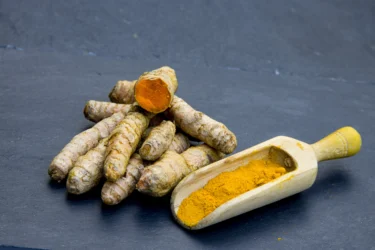
Turmeric, also called Haldi, is used widely for its medicinal properties, especially in India and China. It has various biochemical components that impart the property of alleviating inflammation and acting as an antioxidant. The uses of turmeric are broad; therefore, it finds its use in dealing with sinusitis as well. In Ayurveda, turmeric is used for managing sinusitis, cold, cough, and runny nose3. Turmeric powder can decrease the triggering of allergies, which may cause sinusitis3. So, you can make use of it by mixing a little bit of turmeric in warm milk and drinking it.

A few herbs and oils are used for relieving sinusitis. These oils are used as nasal drops, also known as nasiyam. The leaf or flower extract of thumbai (Tamil name), also known as Chhota halkusa or Gophaa in Hindi, is beneficial for managing sinusitis. You can add a few drops to your nose and inhale them. Dried ginger oil can also be used as nasal drops to deal with sinusitis5.
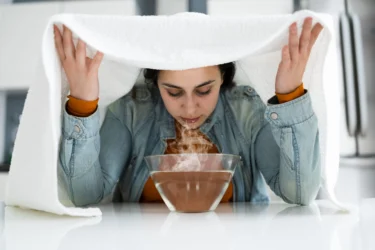
Steam inhalation can be helpful for sinusitis as it causes clearance of the nasal passages leading to drainage of the sinuses easily. It is a straightforward remedy, and all you need to do is boil water and inhale the steam. For added benefits, you can add a few ingredients like lemon leaves, the whole plant of thumbai (Gophaa), or tulsi leaves in the water while it’s boiling4.
Also Read: Home Remedies For Tonsillitis
Generally, self-care seems to help with sinus problems. However, if you notice that your sinusitis worsens or if the infection persists, you should seek the advice of a medical expert. Though it is rare, sinusitis can also cause infection of the eyes, brain, surrounding bones, and the layers surrounding the brain and the spinal cord (meningitis) when left untreated. When you visit a doctor, they might prescribe you medicines or ask you to get specific tests done for further evaluation1.
Also Read: Simple Home Remedies for Sneezing
Sinusitis can cause much discomfort, and gaining relief from it can feel like a reward. It is the swelling of the inner lining of the sinuses and can be caused due to allergies, cold, cough, nasal polyp, or deviated nasal septum. You can try a few home remedies like steam inhalation, pineapples, turmeric, or Manuka honey, which might be the natural solution to your sinusitis. However, even after self-care, if your symptoms do not subside, you should visit a doctor.
Also Read: Home Remedies For Asthma By Dr. Siddharth Gupta
Yes. Bacterial sinusitis is not contagious, but viral sinusitis is. So, if your friend has viral sinusitis, you can get it too. However, if proper hand hygiene and sneezing and coughing etiquette are followed, its spread can be prevented1.
No. There is no evidence of sinusitis leading to permanent loss of hearing.
Yes, sinusitis can occur due to pollen allergy. Allergies of any type can cause sinusitis1.
Although rare, untreated sinus infections can cause infection of the eyes, nearby bone, brain, and meningitis1.
No. A physician diagnoses sinus infection by examining the patient thoroughly. They might ask for additional tests like an endoscopy or computed tomography scan1.
No. Sinusitis can get better with self-care, rest, and increased fluid intake also. Home remedies like pineapples, cod liver oil, ginger, or Manuka honey can also help manage sinusitis. Your doctor may prescribe antibiotics if you have bacterial sinusitis1,2.
1. Sinusitis (sinus infection) [Internet]. Cleaveland Clinic. 2017 [cited 2022 May 25]. p. 1–3. Available from: https://my.clevelandclinic.org/health/diseases/17701-sinusitis
2. Taw MB, Nguyen CT. Complementary and Integrative Treatments Rhinosinusitis. Otolaryngol Clin North Am [Internet]. 2013;46(3):345–66. Available from: https://www.sciencedirect.com/science/article/pii/S0030666513000169?via%3Dihub
3. Prasad S, Aggarwal B. Turmeric, the Golden Spice. In: Benzie, IFF and Wachtel-Galor S, editor. Herbal Medicine: Biomolecular and Clinical Aspects: Second Edition [Internet]. 2nd ed. Boca Raton (FL): CRC Press/Taylor & Francis; 2011. p. 263–88. Available from: https://www.ncbi.nlm.nih.gov/books/NBK92752/
4. Little P, Bryan S, Kelly J, et al. Effectiveness of steam inhalation and nasal irrigation for chronic or recurrent sinus symptoms in primary care: a pragmatic randomised controlled trial. BMJ Open. 2016;6(3):e009153. PMCID: PMC5026511. Available from: https://pmc.ncbi.nlm.nih.gov/articles/PMC5026511/
5. Deve L, Poduval J. Effectiveness of over-the-counter intranasal preparations: A randomized trial. Indian J Otolaryngol Head Neck Surg. 2019 Nov;71(Suppl 3):1923–1928. doi: 10.1007/s12070-018-1331-6. PMCID: PMC6848630. Available from: https://pmc.ncbi.nlm.nih.gov/articles/PMC6848630/
Disclaimer: The information provided here is for educational/awareness purposes only and is not intended to be a substitute for medical treatment by a healthcare professional and should not be relied upon to diagnose or treat any medical condition. The reader should consult a registered medical practitioner to determine the appropriateness of the information and before consuming any medication. PharmEasy does not provide any guarantee or warranty (express or implied) regarding the accuracy, adequacy, completeness, legality, reliability or usefulness of the information; and disclaims any liability arising thereof.
Links and product recommendations in the information provided here are advertisements of third-party products available on the website. PharmEasy does not make any representation on the accuracy or suitability of such products/services. Advertisements do not influence the editorial decisions or content. The information in this blog is subject to change without notice. The authors and administrators reserve the right to modify, add, or remove content without notification. It is your responsibility to review this disclaimer regularly for any changes.
Smooth shiny locks are a hair dream that almost all of us are running after. Unfortunately, our hair can become dry when they do not have enough moisture to maintain their natural shine and texture. With a surge in natural products available for skin and hair care, you might be wondering if there are any safe and effective methods to get silky and shiny hair at home. Well, there are many home remedies that are proposed to make your hair silky. Though they may not work equally for everyone, these are surely worth giving a try. In this blog, let’s explore some simple home remedies that may help make your hair silky and shiny.
Did you know?
Dry hair can occur due to several reasons, which are as follows:
Hair can become dry for multiple reasons. It can lose the oil and moisture and become dry. Microscopically, damage to your hair can be viewed and is referred to as weathering. As a result of the weathering of hair, you might experience tangling and frizzing of hair. When your hair gets extremely damaged, it might also break.
You can identify hair dryness by looking at the hair or touching it. They feel dry to touch and look at. There are various remedies given in the next section that may aid restore the moisture and oil of hair and help them regain their sheen and texture.
To maintain optimal hair quality, it is essential to protect it from the damaging effects of pollution and sun exposure. Covering your hair with a scarf or hat is a simple yet effective method to avoid excessive exposure to these harmful elements.
Dr. Arpit Verma, MBBS MD (Pharmacology)
Our near and dear ones suggest several home remedies when it comes to hair treatment. The remedies are wide-ranging and may or may not work depending on hair type and other individual factors. Here are a few home remedies that you can try to nourish your hair and make it shine.
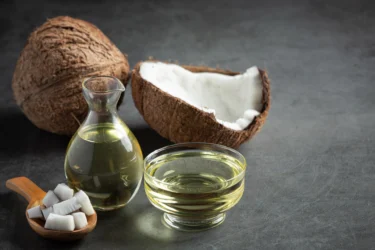
Coconut oil has been used for ages for hair treatment. It imparts shine and is a good hair conditioner. In addition, coconut oil protects the hair from damage and reduces the loss of proteins from it. This helps in maintaining the natural health of hair2. You can use it for making your hair silky by simply massaging the oil onto your scalp and hair strands. Before doing this, you can warm the oil, or you can use it at room temperature. Leaving the oil in your hair overnight and washing it the next day might also be a good home remedy for smooth hair.
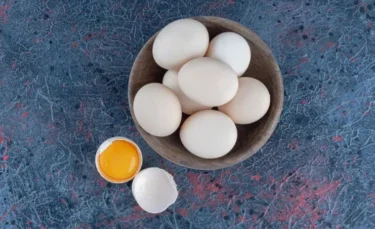
Eggs are a common ingredient used to make hair packs. They are used for softening hair (as an emollient). Here’s how you use eggs to get silky hair at home:
You can keep the pack in your hair for some time and then wash it off with plain water and mild shampoo. However, there is a need for more research to determine the use of eggs in making hair silky at home6.
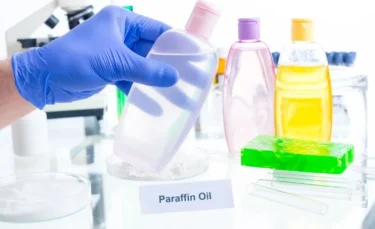
Mineral oil can be used as a remedy for obtaining silky hair, as it helps reduce the splitting of hair ends. It is important to keep in mind that mineral oil does not cause a reversal of hair damage; however, its ability to spread onto hair strands is commendable. Due to this property, mineral oil can form a layer on the strands and aids in easier combing, reduces the number of split ends, and gives a gloss to hair7. You can simply massage mineral oil (at room temperature) of your choice on your scalp and hair strands and leave it for some time. Then, you can comb your hair with a comb and wash the oil off with a mild shampoo to reap its benefits. You can also mix it with olive oil and apply it to your hair.
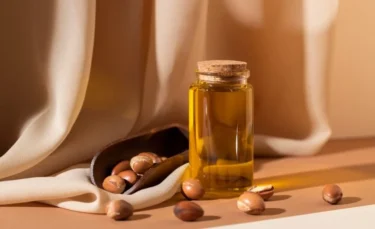
Moroccan argan oil is obtained from the argan tree native to Morocco. This oil is now the most expensive edible oil in the world. There is no specific scientific evidence regarding the use of Moroccan argan oil for hair. However, it is said to have beneficial effects on hair as it helps moisturise hair and makes the hair water-repelling, which is helpful for the health of hair. You can use Moroccan argan oil to massage your scalp. You can leave the oil in your hair overnight and wash your hair the next day to get silky and shiny hair.
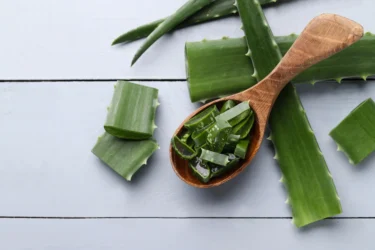
Using aloe vera might be a good home remedy to make hair silky and shiny at home. Aloe vera can help improve hair and scalp health, either alone or along with other factors. It is efficient in eliminating multiple microorganisms from the scalp, protecting hair from the harmful effects of sunlight, and moisturising hair8. Therefore, it has many benefits for hair. The flesh of an aloe vera leaf can be used to apply directly to the head and hair. As a home remedy for silky hair, you can mix aloe vera gel with olive oil and apply this oil to your hair. Then, leave it in for some time before washing it off.

Shea butter can be used for moisturising the scalp and hair. It is obtained from the nut of a tree native to Africa, called the Shea tree. The Shea butter obtained is ivory in colour and is used in the preparation of various bath products like creams and shampoos. It has the property of moisturising and softening hair and can be used as a home remedy that may help in getting smooth hair9. It can be used by mixing in a suitable oil of choice and diluting or applied directly to hair and scalp. After applying, wait for an hour before washing your hair with a mild shampoo and plain water.
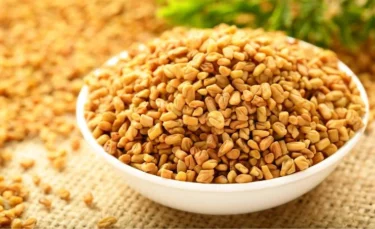
Fenugreek is an aromatic herb and is good for the health of hair. It also prevents hair fall and promotes hair growth. Fenugreek contains multiple bioactive components, due to which it possesses such beneficial properties10. You can use fenugreek oil to obtain long and silky hair. You can also boil a few seeds of fenugreek in coconut oil and apply them to hair and scalp. When the oil cools down, you can use this oil for massaging your head. Leave this oil overnight in your hair and then wash it off the next day to get silky hair. Fenugreek is also present in various herbal formulations that promote hair health.
Also Read: Best Home Remedies For Whiteheads
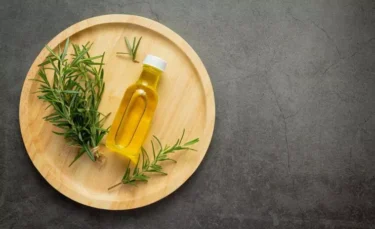
Rosemary is a common shrub that is found in many parts of the world. It is used for its medicinal value to manage other diseases, but it can also be used for getting healthy and silky hair as well. It has the property of stimulating the growth of hair11. Thus, rosemary has many potential benefits for hair. You can take a little bit of rosemary and boil it in a little bit of coconut oil or olive oil to reap its benefits. You can leave this oil in your hair overnight and wash it off with a mild shampoo the next day.
While initial studies have shown that these home remedies may help in getting smooth, shiny hair, further large-scale human trials are needed to confirm these benefits.
Also Read: Natural Home Remedies For Dark Neck
You should seek medical help from a dermatologist (skin and hair doctor) if you:
Remember that home remedies can help get smooth, shiny hair, but in case your hair health is affected due to underlying scalp issues, it’s best to discuss with a dermatologist before using any natural products. Also, these must only be used as an adjunct to any medical treatment prescribed and not a replacement for that.
Also Read: Effective Home Remedies for Lice Removal
Dryness can pose a roadblock to your dreams of getting silky smooth hair. The reasons for dry hair can range from excessive blow-drying of your hair and dry climate to hormonal imbalances. The good news is that you can try to rid yourself of dry hair and obtain silky hair by using some home remedies like coconut oil, eggs, argan oil, etc. Remember, these products may not work similarly for everyone. So, try out these remedies consistently and see which one is a better match for your hair. However, if dryness persists or you notice unexplained symptoms, make sure that you visit your dermatologist and seek medical advice.
Yes, coconut oil can help repair damaged hair and prevent further damage by reducing the loss of proteins from hair. It also moisturises the hair, thus providing a shine to it4.
Yes, you can use eggs for making a hair pack as they provide moisture to the hair. You can use eggs by adding olive oil and garlic to them. You can also add honey and turmeric or mix the egg yolk with almond oil5. You can keep this hair mask for 30-40 minutes in your hair and then wash it off with a mild shampoo and water.
No, there are no reports of charcoal having beneficial effects for obtaining silky hair.
Yes, if you blow-dry your hair excessively, it can cause drying of hair1. You can try a few home remedies like eggs, coconut oil, and aloe vera for getting silky hair.
No. There is no evidence regarding the beneficial effects of pepper in obtaining silky hair.
Yes, hypothyroidism (an underactive thyroid gland leading to decreased thyroid hormone) can cause dry hair1.
Disclaimer: The information provided here is for educational/awareness purposes only and is not intended to be a substitute for medical treatment by a healthcare professional and should not be relied upon to diagnose or treat any medical condition. The reader should consult a registered medical practitioner to determine the appropriateness of the information and before consuming any medication. PharmEasy does not provide any guarantee or warranty (express or implied) regarding the accuracy, adequacy, completeness, legality, reliability or usefulness of the information; and disclaims any liability arising thereof.
Links and product recommendations in the information provided here are advertisements of third-party products available on the website. PharmEasy does not make any representation on the accuracy or suitability of such products/services. Advertisements do not influence the editorial decisions or content. The information in this blog is subject to change without notice. The authors and administrators reserve the right to modify, add, or remove content without notification. It is your responsibility to review this disclaimer regularly for any changes.
Have you been experiencing an uncomfortable swelling around your testicles? Chances are that you may have developed a hydrocele. It may be difficult for you to understand what this could be, causing stress and panic. Therefore, knowledge about this condition, its symptoms and management can be extremely useful to take the next step. While surgery is a common management modality in modern medicine, traditional medicine has used phytotherapy (treatment using plant species) for managing hydrocele1.
In this blog, we will discuss about hydrocele and its symptoms and also share some home remedies that can help deal with this condition.
Did you know?
Medical terms such as hydrocele are most often beyond the knowledge of an average man; therefore, even if you may be experiencing symptoms, it could be challenging to assess what exactly it is. Hydrocele indicates swelling around the scrotum area which is more commonly observed in newborn babies and usually gets better after some time without any external treatment. However, in adolescent boys and older men, this condition is generally caused by an inflammatory agent or injury inside the scrotal sac. The accumulation of fluid in the scrotal sac causes swelling2.
Hydrocele usually is pain-free and doesn’t pose serious threats to the patient; however, it is always better to be on the safe side and consult with your doctor to get an expert advice on what is causing the swelling.
If you observe pain-free swelling in both or either one of your testicles, it is advised to check with your doctor.
Even though hydrocele under usual circumstances doesn’t result in pain, adult men may experience a feeling of heaviness or some amount of discomfort due to size fluctuation in the scrotum region. In some cases, the swollen area has visibly altered sizes which can cause increased pain and requires medical attention3.
Congenital hydroceles mostly resolve before two years of age. Therefore, parents of such patients should be properly counselled to curb their anxiety. In this regard, providers and nursing staff play a vital role. If hydrocele develops later in life, underlying pathology must be identified, as its prognosis is dependent on it.
Dr. M.G. Kartheeka, MBBS, MD(Pediatrics)
Hydrocele is generally considered a harmless condition. However, there may be various other factors contributing to the swelling of scrotal sac. It is always best to be aware of the potential health risks. You should not self-diagnose your condition or neglect the issue as it may worsen over time. A professional diagnosis renders essential information to take into account. A doctor’s thorough examination will help you establish whether what you are dealing with is entirely non-threatening or carries an underlying health issue that could cause more significant damage.
If you feel you might have an hydrocele, then consult your doctor for diagnosis and management of the condition. Along with medical management, adopting some home remedies may also help in easing the discomfort in your scrotum.
Here are some quick, simple, and effective home remedies you can try:
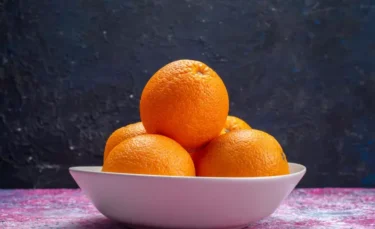
Our diet directly impacts our health. A diet rich in fruits like oranges, apples, pineapples, grapes and peaches can support the immune system and maintain overall health. Especially fruits rich in antioxidants such as strawberries may aid in the body’s detoxification and help dealing with hydrocele5.
However, if you do switch to a fruit-based diet, then it is essential to avoid canned fruits as they consist of high levels of preservatives and additives that can worsen your condition. Moreover, if you have medical conditions like diabetes, it’s best to discuss with your doctor which fruits you can safely take and in how much quantity.

As important as it is to eat your fruits, it is also essential to add a healthy amount of greens to your regular diet. Including lightly sauteed veggies and fresh vegetable salad in your everyday life can play a contributing role in upgrading your quality of life and helping deal with the symptoms of hydrocele5.

A healthy diet ensures a healthy mind and body. Eliminate the toxins from your body by hydrating yourself with loads of water and healthy fluids5.
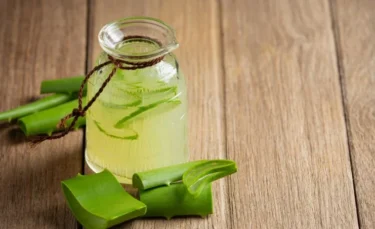
A concoction made of aloe vera and amla juice mixed in equal proportions and consumed every morning on an empty stomach can also be helpful. Their antioxidant and anti-inflammatory properties may help with itching, irritation and puffiness. But talk to a healthcare expert before trying anything new.
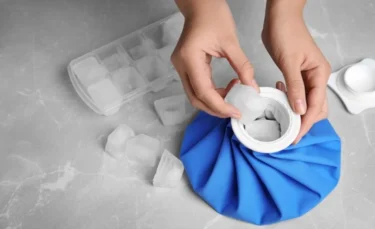
Using ice packs at least 2 to 3 times a week may help in easing the pain and soreness5.

Switching to healthier lifestyle alternatives and exercise may help reduce the size of swelling and uneasiness of scrotum6. And yoga may be the right and effective exercise in providing relief to the pain caused by hydrocele. However, it’s important to practice under the guidance of a trained yoga expert to avoid exercises and asanas that can put undue pressure on scrotal areas7.
Also Read: Best Home Remedies for Upset Stomach
Hydrocele or swelling in the scrotal sac can be worrisome if you don’t know about it. Understanding its symptoms can help in diagnosis and reduce panic associated with this condition. While home remedies may help manage mild hydrocele symptoms, these are not a substitute for medical management. If discomfort persists or worsens, it’s important to consult a healthcare professional for proper diagnosis and treatment.
When occurring in newborns, the possibility of a hydrocele disappearing on its own within a year is 70%. Only if the hydrocele remains after two years will the operation be needed. Also, your doctor will evaluate the condition and give the best advice on the necessary treatment.
In an adult, when the hydrocele exhibits a medium to large size, surgery may be the best possible option. Leaving it untreated may cause it to expand in size over a time period causing inconvenience while partaking in daily activities along with constant itching, pain, discomfort and risks of potent infections.
Even though it is pretty uncommon for hydroceles to recur post operation, the possibility cannot be completely ruled out, significantly when the hydrocele has expanded massively.
Disclaimer: The information provided here is for educational/awareness purposes only and is not intended to be a substitute for medical treatment by a healthcare professional and should not be relied upon to diagnose or treat any medical condition. The reader should consult a registered medical practitioner to determine the appropriateness of the information and before consuming any medication. PharmEasy does not provide any guarantee or warranty (express or implied) regarding the accuracy, adequacy, completeness, legality, reliability or usefulness of the information; and disclaims any liability arising thereof.
Skin ageing is a complex natural process that occurs because of inborn or natural factors (hormones, cellular metabolism, genetics and metabolic processes) or external factors (chemicals, pollution, long-term exposure to light, toxins and ionising radiation)1. The skin ageing process that is controlled by genetics is known as intrinsic ageing, while environmentally induced aging is known as extrinsic aging or photo-aging1.
Fine wrinkles and a thinner epidermis (the outermost layer of skin in the body) are common signs of intrinsic ageing as people become older2. Anti-aging is a therapeutic process that requires several steps as it is a combination of several methods for the restoration of different layers of skin1. There is a rise in demand for healthier options for anti-ageing skincare approaches. This includes a good skincare routine and exploring the relevance and potential of diverse natural resources2. Read along to find out some home remedies that can come in handy.
Did you know?
Biologically, aging occurs due to the build-up of a range of molecular and cellular injuries over time. As a result, there is a gradual reduction in the physical and mental capacities of individuals as well as an increased risk of disease and eventually death. These changes are not constant and are only related to a person’s age in years3. The surroundings in which people grow up along with their traits influence how they age in the long run. There are two types of factors that cause ageing; these are intrinsic and extrinsic factors. There are different pathways and mechanisms for intrinsic and extrinsic ageing, but there is synergy in the effect of both the types for every individual2.
The changes that can be noticed in your skin due to ageing are:
Several natural and sustainable remedies are available for anti-aging. Several measures that involve simple changes in lifestyle can be beneficial. These include avoiding excessive sun exposure, maintaining a healthy diet and following appropriate skin care practices1,2. Different home remedies for anti-aging include:
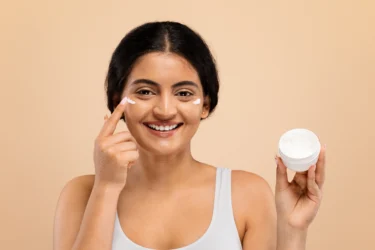
The three types of moisturising agents are emollients, occlusives and humectants2.
Anti-ageing remedies like moisturizers can plump up fine lines in a few days, but most products take at least six weeks to three months at times to work. Be patient and give the product time to work.
Dr. Ashish Bajaj, M.B.B.S., M.D. in Clinical Pharmacology and Toxicology
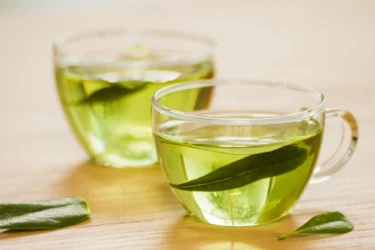
Anti-oxidants nourish the skin and protect it from free radical damage by substituting for the skin components that free radicals normally destroy. Anti-oxidants can be grouped into water-soluble anti-oxidants and oil-soluble anti-oxidants. Water-soluble anti-oxidants include vitamin C, coffeeberry, green tea and glutathione. Oil-soluble anti-oxidants include vitamin E and vitamin A2.
Red wine has anti-ageing properties and is present in different anti-oxidant skincare formulations. Apart from this compound, certain compounds present in peanuts and alfalfa sprouts help to manage and prevent wrinkles due to ageing2. There are two ways to take anti-oxidants for skin, i.e., dietary inclusion and topical application.

Vitamins play an essential role in skincare. Vitamins that are commonly used in skincare include vitamin A, vitamin E and vitamin C.
There are two ways to use vitamins for skin-oral intake and topical application.
Vitamins C, B3, and E are the most important antioxidants because of their ability to penetrate the skin through their small molecular weight.52 The water-soluble, heat-labile local L-ascorbic acid (vitamin C) in concentrations between 5 and 15% was proven to have a skin anti-aging effect . So whenever choosing fruits or creams look for these ingredients.
Dr. M.G. Kartheeka, MBBS, MD(Pediatrics)
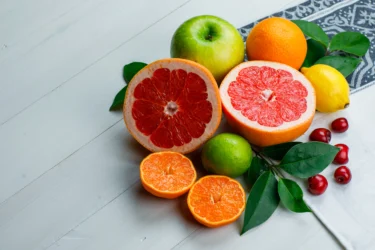
These acids are also referred to as fruit acids. They are known due to their anti-ageing effects, such as reducing fine wrinkles, spots, discoloured skin and dryness. Hydroxy acids are grouped into alpha-hydroxy acids and beta-hydroxy acids2.
The alpha-hydroxy acid group includes citric acid (obtained from citrus fruits), lactic acid (obtained from fermented fruits), glycolic acid (obtained from sugarcane), and tartaric acid (obtained from grapes) and malic acid (from fruits)2.
Alpha-hydroxy acids are helpful in managing dry and ageing skin. Beta-hydroxy acids can be used on oily and acne-prone skin2. Topical applications of alpha-hydroxy acids can be used for skin care.
Also Read: Simple Home Remedies For Acne Scars
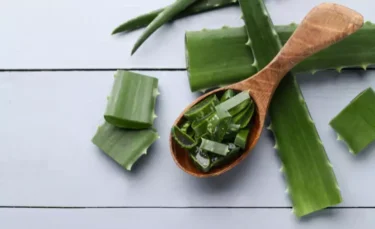
Sunburns, dark patches, discolourations, sagging or leathering, and wrinkles are all caused by ultraviolet (UV) B radiation, which is a shorter wave UV ray. Several natural remedies are known to protect from sun exposure. These include aloe vera, coconut oil, ginger, green tea, shea butter, vitamin E, caffeic acid and tamanu oil2. Topical applications of these herbs can be made for skin care in the following manner:
Some sunscreen can be taken and applied to your face. You can use a moisturiser after applying sunscreen. Sunscreen can be used every day before you are exposed to the sun.

These agents work by decreasing the quantity of melanin (the pigment responsible for skin pigmentation). Skin lightening agents are helpful in skin problems such as dark age spots, dullness and hyper-pigmentation, which are common conditions associated with ageing. Several natural agents are used as skin lightening agents, such as white mulberry extract, bearberry extract, vitamin B3, liquorice extract, citrus extract and Indian gooseberry2. These agents can be mixed with ingredients such as yoghurt and honey and then applied to the face.

These are useful ingredients in the skincare regimen for strengthening skin barrier function and boosting overall skin health. Natural oils have fatty acids that play an important role in maintaining the skin barrier and preventing ageing2.
The two groups of essential fatty acids include omega-3s and omega-6s. Omega-3s are present in flaxseed oil, chia oil and walnut oil. Omega-6s are present in safflower oil, sunflower oil, grapeseed oil and evening primrose oil2. A few drops of these oils can be taken on your palm, rubbed to make it warm and then massaged on your face.
Also Read: Natural Home Remedies for Itchy Skin
You can visit the doctor in the following cases:
Also Read: How to Get Rid of Skin Tags: A Step-by-Step Guide Based on Science
A variety of lifestyle measures such as avoiding excessive sun exposure, maintaining a healthy diet and following appropriate anti-ageing skincare practices can help in graceful ageing. With age, a lot of changes can be observed in the skin, such as less elasticity, thin and more fragile skin. Skin becomes more susceptible to bruising. Age spots and skin tags become very common as you age. With age, you can also develop dry skin. Natural ingredients are considered safe and effective for managing the symptoms of ageing. Home remedies such as cocoa butter, avocado oil, almond oil, castor oil, honey, jojoba oil, beeswax, green tea, shea butter, oats, turmeric and sunflower oil can be used on the face for anti-ageing benefits. It is essential to consult your physician if your condition starts affecting your mental health or if there are visible signs of premature ageing.
Also Read: Home Remedies For Dark Underarms
Avoiding smoking, overexposure to the sun, stress, following proper nutrition and physical activity and maintaining general health are some ways to delay signs of ageing1.
Age spots, also called liver spots, are flat, brown spots associated with ageing. These occur mostly due to long periods of exposure to the sun. They are bigger than freckles in appearance and commonly develop on the face, arms, hands, feet and back. Using sunscreen can help to prevent age spots2,4.
An anti-ageing skincare routine generally consists of vitamins along with other components. These can enhance skin texture and elasticity. Vitamins are vital for skin care as they reduce the appearance of wrinkles. Some of the commonly used vitamins in skincare include vitamins A, E and C. Vitamins can either be consumed or applied topically for benefits2.
With age, the skin becomes thinner and losses elasticity and even becomes more fragile as the fatty tissue content below the skin reduces. There is also reduced production of natural oils that makes the skin drier. Some of the visible signs of skin ageing are age spots, wrinkles and small growths called skin tags4.
Disclaimer: The information provided here is for educational/awareness purposes only and is not intended to be a substitute for medical treatment by a healthcare professional and should not be relied upon to diagnose or treat any medical condition. The reader should consult a registered medical practitioner to determine the appropriateness of the information and before consuming any medication. PharmEasy does not provide any guarantee or warranty (express or implied) regarding the accuracy, adequacy, completeness, legality, reliability or usefulness of the information; and disclaims any liability arising thereof.
Links and product recommendations in the information provided here are advertisements of third-party products available on the website. PharmEasy does not make any representation on the accuracy or suitability of such products/services. Advertisements do not influence the editorial decisions or content. The information in this blog is subject to change without notice. The authors and administrators reserve the right to modify, add, or remove content without notification. It is your responsibility to review this disclaimer regularly for any changes.
Partied too hard and not feeling like you can drag yourself out of bed? We have all heard of that hungover friend or experienced hangovers after a night of drinking too much. Drinking too much the night before can make you feel haggard when you wake up.
A hangover is that unpleasant feeling you wake up with after drinking excessive alcohol. It begins several hours after you stop drinking. The symptoms vary from person to person and depend on the type and amount of alcohol you had. A hangover usually gets better on its own within a day1. It is important to note that there is no quick cure to manage hangovers; the body requires plenty of time to get rid itself of the hangover2.
If you feel hungover, you can try the simple home remedies mentioned below to get some relief from the
Drinking heavily is the primary cause of hangovers, but several factors can contribute to how bad the symptoms are.
Alcohol makes you urinate frequently, leading to the loss of fluids. Headache, thirst and fatigue are common symptoms that occur as a result of dehydration2.
The sleep you get after drinking heavily is fragmented and short. As a result, people often wake up tired and exhausted and face a loss of productivity2.
Heavy drinking can cause inflammation, making you feel uncomfortable when you are hungover and sick2.
The brains of people who drink quickly adjust to the calming and euphoric effects of alcohol. When the alcohol wears off, you tend to feel more restless and anxious2.
Alcohol irritates the lining of the stomach, triggering the production of acids. Excessive acid in the stomach gives the feeling of nausea and discomfort2.
When the alcohol in the body gets metabolised by the liver, it is converted to a chemical called acetaldehyde. Acetaldehyde is a toxic compound, which causes inflammation in organs such as the brain, liver, pancreas, and digestive track2.
Did you know?
The major symptoms associated with a hangover are:
Binge drinking within a short period causes a hangover, Potency of alcohol metabolizing enzymes varies between different sexes, ethnicities and different age groups. Slow drinking and hydrating oneself frequently might prevent dehydration in some people. If the person is alcohol dependent then he should visit his physcian so that the alcohol use disorder can be managed via proper rehabilitation through medicines and behavioural therapy.
Dr. Nikhil Yadav, MBBS MD, CCEBDM
There is no magical cure to get rid of hangovers; give your body enough time to recover from the toxic effects of alcohol2. Meanwhile, you can try these home remedies to manage the symptoms and aid in your recovery.

Drinking alcohol promotes urination in people, leading to the loss of fluids from the body. If you also experience sweating, diarrhoea, and vomiting, your body might become dehydrated. To recover from the loss of fluids, try drinking plenty of water when you wake up3. Drinking water before bed can help reduce the severity of a hangover.
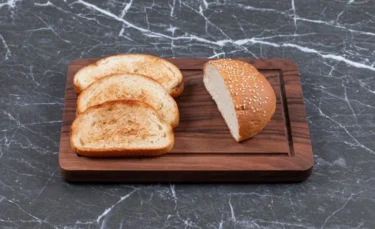
Drinking alcohol can lower blood sugar levels, which results in fatigue and headache. People often forget to eat something while on a drinking binge. This causes a further decrease in blood sugar levels. Getting some carbohydrates in your system can help with the symptoms of a hangover. You can try bland foods with carbohydrates, for example, toast and crackers. It will help to minimise nausea and enhance blood sugar levels1,3.

The caffeine present in coffee and tea acts as a stimulant. It can help with the grogginess that accompanies hangovers3. Brew your favourite tea or coffee when you wake up. This way, you can sip on some tea or coffee to relieve the feeling like you just came back from war.

You need to get plenty of rest to recover from the hangover. The effects of alcohol can interfere with your ability to perform tasks, even if you feel good the next morning. Try getting as much sleep as possible to counteract fatigue1,4.
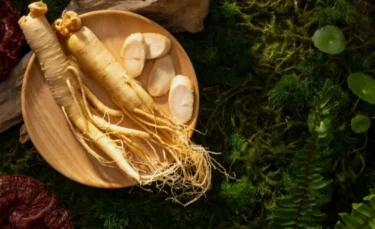
Ginseng can help you to remove alcohol faster from the body as it enhances alcohol metabolism. That’s how it is beneficial in relieving hangover symptoms. Ginseng might also be effective in alcohol toxicity and acts as an anti-hangover agent5. There are several ways to use ginseng. For example, you can boil some fresh ginseng with water to make a tea to sip on. You can also add ginseng to your foods and dishes.

Ginger is a natural anti-oxidant, making it a natural remedy to get rid of the toxicity of alcohol. Ginger might also effectively relieve hangover symptoms such as diarrhoea, nausea, and vomiting, and reduce the discomfort associated with a hangover5. Ginger has been found to be effective in reducing nausea associated with hangovers. You can sip on some fresh ginger tea to help with hangover symptoms.

You need at least 24 hours to get rid of all the symptoms of a hangover. Your body needs time to clear out all the toxic by-products of alcohol present in the system, get plenty of hydration, heal the liver, and restore the activities and functions of the body to normal1.
Also Read: Simple Home Remedies for Frequent Urination

Also Read: Natural Home Remedies for Fatty Liver
Also Read: Effective Home Remedies For Red Eyes
Hangovers leave on their own even if you do not do anything. Your body will start to feel better with time. You should consult with your healthcare provider if you experience signs of alcohol abuse:
Also Read: Home Remedies To Cure Bad Breath Naturally
Hangovers can be bothersome and sometimes, painful too. There are many home remedies claiming to magically cure hangovers. Still, the best course of action for you is to be patient and rest, allowing your body to get rid of all the toxic by-products from its system. Drinking plenty of water and eating food rich in carbohydrates are some basic ways that help aid recovery. Hangovers typically do not require any medical intervention. However, if you notice signs of an alcohol use disorder, heavy drinking within a short period, severe withdrawal symptoms or frequent hangovers that affect your quality of life, you need to consult your healthcare provider immediately.
Also Read: Home Remedies For Vomiting
The best thing you can do is get rest and hydrate your body. You can also try eating some crackers and toast to raise blood sugar levels. Drinking a caffeinated drink, for example, tea or coffee, can help you fight off the grogginess of hangovers. You can use ginger and ginseng to help improve your symptoms1,3,5.
You need to exercise caution when using medicine before or after consuming alcohol. Taking any medicine that contains acetaminophen while there is alcohol in your system can cause liver toxicity. Pain relievers like ibuprofen can irritate the stomach lining2. It is best to avoid any medicine straight after consuming alcohol.
Having yet another drink to cure hangovers should be avoided. This practice is known as the hair of the dog, which means taking the hair of the dog that bit you. Drinking alcohol to cure hangovers will only increase alcohol toxicity in the body1,3.
Hangover symptoms usually subside after a day (24 hours) on their own. The symptoms improve as soon as the alcohol leaves your system1.
There is a way to enjoy drinking without worrying about the unpleasant symptoms of a hangover. You can avoid drinking alcohol on an empty stomach. You can drink moderate quantities to prevent hangovers. You can also keep sipping on water in between your drinks to help you reduce the consumption of alcohol and keep yourself hydrated. Drink slowly and choose light-coloured alcoholic beverages. Light-coloured beverages such as light beer, vodka, white wine and gin result in less severe hangover symptoms1.
Alcohol poisoning is a severe side effect of heavy drinking. Alcohol poisoning can be life-threatening. If you notice signs in anyone who has been drinking, contact your nearest healthcare provider immediately. Symptoms of alcohol poisoning include seizures, vomiting, confusion, unconsciousness, slow or irregular breathing, pale skin, and low body temperature6.
1. Cleveland Clinic [Internet]. Hangover; 2020 Sept 24 [cited 2022 May 23]. Available from: https://my.clevelandclinic.org/health/diseases/16627-hangover
2. National Institute on Alcohol Abuse and Alcoholism (NIAAA) [Internet]. Hangovers; 2021 Mar 1 [cited 2022 May 23]. Available from: https://www.niaaa.nih.gov/publications/brochures-and-fact-sheets/hangovers
3. Harvard Health [Internet]. 7 steps to cure your hangover; [cited 2022 May 23]. Available from: https://www.health.harvard.edu/staying-healthy/7-ways-to-cure-your-hangover
4. MedlinePlus [Internet]. Hangover treatment; 2022 Jan 6 [cited 2022 May 23]. Available from: https://medlineplus.gov/ency/article/002041.htm
5. Wang F, Li Y, Zhang YJ, Zhou Y, Li S, Li HB. Natural Products for the Prevention and Treatment of Hangover and Alcohol Use Disorder. Molecules. 2016 Jan ;21(1):64. Available from: https://www.mdpi.com/1420-3049/21/1/64
6. Jung YC, Namkoong K. Alcohol: intoxication and poisoning – diagnosis and treatment. Handbook of Clinical Neurology. 2014;125:115-21. doi:10.1016/B978-0-444-62619-6.00007-0. Available from: https://pubmed.ncbi.nlm.nih.gov/25307571/
7. Verster JC, Stephens R, Penning R, Rohsenow D, McGeary J, Levy D, et al.; Alcohol Hangover Research Group. The alcohol hangover research group consensus statement on best practice in alcohol hangover research. Curr Drug Abuse Rev. 2010 Jun;3(2):116-26. PMCID: PMC3827719. Available from: https://pmc.ncbi.nlm.nih.gov/articles/PMC3827719/
Disclaimer: The information provided here is for educational/awareness purposes only and is not intended to be a substitute for medical treatment by a healthcare professional and should not be relied upon to diagnose or treat any medical condition. The reader should consult a registered medical practitioner to determine the appropriateness of the information and before consuming any medication. PharmEasy does not provide any guarantee or warranty (express or implied) regarding the accuracy, adequacy, completeness, legality, reliability or usefulness of the information; and disclaims any liability arising thereof.
Links and product recommendations in the information provided here are advertisements of third-party products available on the website. PharmEasy does not make any representation on the accuracy or suitability of such products/services. Advertisements do not influence the editorial decisions or content. The information in this blog is subject to change without notice. The authors and administrators reserve the right to modify, add, or remove content without notification. It is your responsibility to review this disclaimer regularly for any changes.
Have you noticed small, black holes in your teeth? Did you dismiss them as just stains? They may not be just stains; they can be early signs of tooth decay. Since childhood, we have been told not to eat sweets and chocolates, as they may destroy our teeth. The bacteria in our mouth use the sugar and starch from our food to produce acid that destroys the tooth. The small spot can turn into a big hole in no time, cause pain, and if it is not treated in time, you might even lose your tooth1. This decay is commonly referred to as cavities, also known as dental caries. You can prevent cavities by brushing and flossing your teeth properly2.
There are plenty of bacteria in the mouth, some are helpful to us, and others cause harm. These harmful bacteria are responsible for the decay of teeth. The bacteria together form a film (plaque) and participate in making acid from the food that you eat, mainly from sugars and starches. This acid forms and damages the teeth, which we see as decay. As part of a natural process, our teeth keep losing and regaining minerals. If we do not care for our teeth properly, it results in the loss of more minerals than we can regain, thus leading to tooth decay1.
There are a few signs that you should look out for if you think that you have tooth decay. The symptoms of tooth decay are:
The best way to avoid the decay of teeth is to take care of them by maintaining proper oral hygiene. All the remedies suggested here are to maintain oral health and prevent the formation of cavities. The following are a few home remedies for better and healthier teeth.

Oil pulling is an Ayurvedic procedure that helps maintain oral hygiene. In one of the many studies conducted, it was seen that oil pulling reduces the number of bacteria in the mouth and decreases plaque formation, which might prevent tooth decay in the long run. In this procedure, a small amount of coconut oil, sesame oil, or sunflower oil, in its pure form (preferably cold-pressed), is used to swish around the mouth, ensuring that all the teeth are covered. This procedure is to be done in the morning on an empty stomach before brushing your teeth3. There is a need for more research regarding the benefits of oil pulling; nonetheless, it is being used.
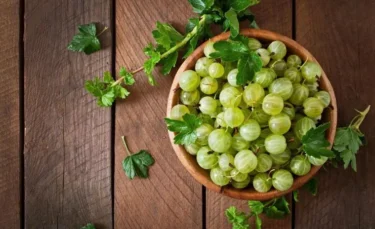
Amla is a herb that is commonly used in Ayurveda. It is a fruit and can be used in the form of a decoction and for rinsing the mouth, as it is generally known to be good for oral health. Not only that, we can consume a little bit of amla daily to reap its long-term benefits for teeth4. As amla helps maintain healthy teeth, it may also be beneficial in preventing tooth decay.
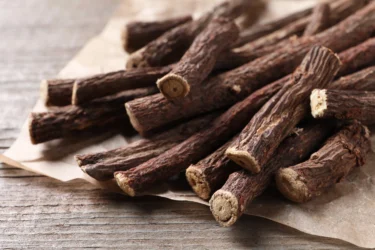
Liquorice is also called the ‘sweet herb’, Yashtimadhu (Sanskrit), or mulethi. In recent years, researchers have been extensively studying the benefits of liquorice. In one such study5 conducted, it was found that liquorice contains bioactive compounds that are effective in destroying the bacteria Streptococcus mutans or S. mutans, responsible for causing tooth decay. Therefore, liquorice may prevent the decay of the tooth. Furthermore, we can chew the root of liquorice to protect our teeth from cavities.
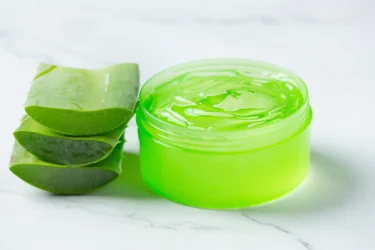
Aloe vera gel has a wide range of uses. It has anti-microbial (germ-killing) and anti-inflammatory (inflammation-reducing) properties due to the presence of bioactive compounds. A study6 has shown that aloe vera gel effectively kills and removes bacteria (S. mutans and Lactobacillus spp.), which are known for their involvement in cavity formation (dental caries). In this way, aloe vera gel might protect the tooth from decay. It can be used by making juice and drinking it daily. It can also be used as a toothpaste to brush teeth daily to receive its benefits.
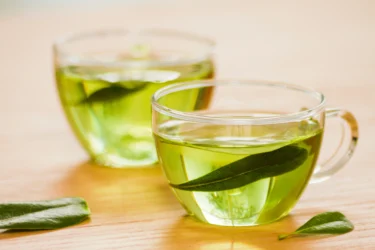
Green tea has anti-bacterial properties; thus, it is said to lower the number of bacteria in the mouth that have the potential to cause cavities. It also contains a high amount of fluoride. Fluoride is a mineral that protects teeth from decay by helping them to regain minerals. Researchers8 have found that green tea prevents caries (anti-cariogenic) in animal models. It might be because of its anti-bacterial activity due to the presence of certain substances. Studies in humans have been inconclusive; hence, further research is needed to conclude. You can consume green tea as a beverage by using its leaves or a teabag to brew a hot cup of green tea.
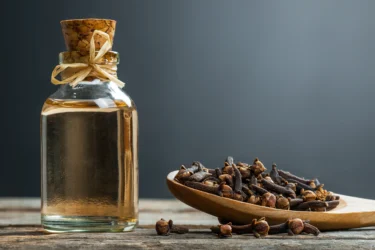
An experiment was conducted to understand the effect of clove oil on tooth decay by preventing decalcification (loss of minerals from teeth). In this experiment, it was found that clove oil-treated teeth showed less mineral loss when subjected to acids, which can destroy teeth. Its action might be similar to that of fluoride in preventing tooth decay7. Further studies need to be conducted to prove its use as a tooth decay-preventing agent in humans. Clove oil is a common component of many kinds of toothpaste. You can use it by mixing a little clove oil in your toothpaste and brushing your teeth using this paste twice daily.
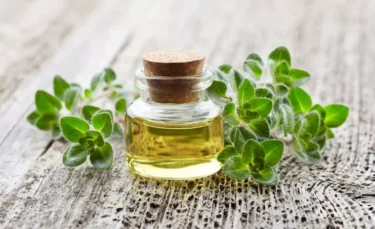
Oregano oil is an essential oil. It has the property of destroying various microorganisms like bacteria, fungi, etc. Therefore, its potential to kill tooth-decaying bacteria was evaluated in a study. This study9 showed that when oregano oil was added to a toothpaste, which was already efficient in killing bacteria, its efficiency increased twofold. Thus, it helps in the prevention of tooth decay. You can mix oregano oil with your regular toothpaste and use it to brush your teeth daily.
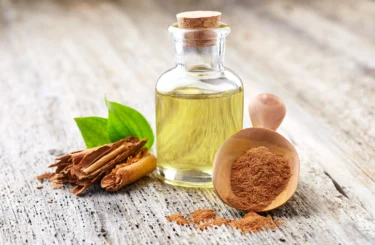
In the same study9 mentioned above, the activity of the oil from one of the cinnamon species, Cinnamomum cassia (Chinese cinnamon), was also studied. The bacteria-destroying activity of cinnamon oil was evident. Thus, cinnamon oil might be used in the prevention of dental cavities. You can make use of this oil in the same way by mixing it in toothpaste and brushing your teeth daily.
Also Read: Simple Home Remedies for Swollen Gums
You should seek help from a dentist if:
Also Read: Simple Tips You Can Follow for Heartburn Relief!
The best way to protect your teeth from getting damaged due to tooth decay is to keep them clean. Cavities can occur when the bacteria present in your mouth use the food particles left behind from improper cleaning to make acid, which damages the teeth. You might see a cavity and experience sensitivity and pain. Sometimes, there can also be an infection of the teeth and mouth. You can prevent the formation of cavities by the use of a few home remedies, such as oil pulling, clove oil, aloe vera gel, and green tea. However, if you have a cavity, pain, or swelling, notice signs of infection, experience bleeding from gums, or have difficulty chewing, you should pay a visit to your dentist. Prevention is always better than a cure, and you can do it by simply following proper oral hygiene. So, let us make sure that we can take care of our teeth and protect them from decay.
Also Read: Simple Home Remedies For Dry Throat
No, black holes in your teeth may be tooth decay. Consult your dentist to be sure.
No, tooth brushing cannot help your decay go away. However, it can prevent tooth decay.
Yes, in many studies9, clove oil was found to have similar effects to fluoride in preventing tooth decay. Further research is required to be sure of it.
Yes, green tea has high fluoride content and anti-bacterial properties, both of which are known to be beneficial in preventing tooth decay.
1. National Institute of Dental and Craniofacial Research. Tooth decay [Internet]. Bethesda (MD): National Institute of Dental and Craniofacial Research; [cited 2025 May 28]. Available from: https://www.nidcr.nih.gov/health-info/tooth-decay
2.Centers for Disease Control and Prevention. About cavities (tooth decay) [Internet]. Atlanta (GA): Centers for Disease Control and Prevention; 2024 May 15 [cited 2025 May 28]. Available from: https://www.cdc.gov/oral-health/about/cavities-tooth-decay.html
3. Shanbhag VKL. Oil pulling for maintaining oral hygiene – A review. J Tradit Complement Med [Internet]. 2017 Jan [cited 2022 May 26];7(1):106-9. Available from: http://dx.doi.org/10.1016/j.jtcme.2016.05.004
4. Singh A, Purohit B. Tooth brushing, oil pulling and tissue regeneration: A review of holistic approaches to oral health. J Ayurveda Integr Med [Internet]. 2011 Apr [cited 2022 May 26];2(2):64-8. Available from: https://www.ncbi.nlm.nih.gov/pmc/articles/PMC3131773/pdf/JAIM-2-64.pdf
5. Sidhu P, Shankargouda S, Rath A, Ramamurthy PH, Fernandes B, Singh AK. Therapeutic benefits of liquorice in dentistry. J Ayurveda Integr Med [Internet]. 2020 Oct [cited 2022 May 26];11(1):82-8. Available from: https://www.ncbi.nlm.nih.gov/pmc/articles/PMC7125382/pdf/main.pdf
6. Bałan BJ, Niemcewicz M, Kocik J, Jung L, Skopińska-Różewska E, Skopiński P. Oral administration of Aloe vera gel, anti-microbial and anti-inflammatory herbal remedy, stimulates cell-mediated immunity and antibody production in a mouse model. Cent Eur J Immunol. 2014 Jun 27;39(2):125–130. doi:10.5114/ceji.2014.43711. PMID: 26155113; PMCID: PMC4440021. Available from: https://www.ncbi.nlm.nih.gov/pmc/articles/PMC4440021/
7. Marya CM, Satija G, Avinash J, Nagpal R, Kapoor R, Ahmad A. In Vitro Inhibitory Effect of Clove Essential Oil and Its Two Active Principles on Tooth Decalcification by Apple Juice. Int J Dent [Internet]. 2012 May [cited 2022 May 26];2012:759618. Available from: https://www.ncbi.nlm.nih.gov/pmc/articles/PMC3432374/pdf/IJD2012-759618.pdf
8. Melok AL, Lee LH, Mohamed Yussof SA, Chu T. Green tea polyphenol epigallocatechin-3-gallate-stearate inhibits the growth of Streptococcus mutans: a promising new approach in caries prevention. Dent J (Basel). 2018 Aug 6;6(3):38. doi:10.3390/dj6030038. PMID: 30082585; PMCID: PMC6162448. Available from: https://www.ncbi.nlm.nih.gov/pmc/articles/PMC6162448/
9. de Oliveira Carvalho I, Purgato GA, Píccolo MS, Pizziolo VR, Coelho RR, Diaz-Muñoz G, Alves Nogueira Diaz M. In vitro anticariogenic and antibiofilm activities of toothpastes formulated with essential oils. Arch Oral Biol. 2020 Sep;117:104834. doi:10.1016/j.archoralbio.2020.104834. PMID: 32663696. Available from: https://pubmed.ncbi.nlm.nih.gov/32663696/
Disclaimer: The information provided here is for educational/awareness purposes only and is not intended to be a substitute for medical treatment by a healthcare professional and should not be relied upon to diagnose or treat any medical condition. The reader should consult a registered medical practitioner to determine the appropriateness of the information and before consuming any medication. PharmEasy does not provide any guarantee or warranty (express or implied) regarding the accuracy, adequacy, completeness, legality, reliability or usefulness of the information; and disclaims any liability arising thereof.
You might have heard a wind instrument playing; it sounds beautiful, right? But when you hear a similar sound coming from someone’s body, while they breathe, it might be alarming. The shrill whistle or the coarse rattle like sound that we hear on breathing is called wheezing. It can be caused when a part of the air passage is blocked due to conditions like asthma, bronchitis, allergies, etc. Depending on the part of the airway that is blocked, the type of sound that is heard varies. All wheezes are not audible to the human hear some can only be heard using a stethoscope. Generally, wheezing can be heard when we breathe out (exhale), but sometimes it can be heard when we breathe in (inhale) as well1. You might not find a way for how to stop wheezing immediately without consulting a doctor, but there are various home remedies that you can try that may help relieve wheezing.
Did you know?
There is a network of tubes in our body starting from the nose and leading to the lungs called as bronchi. When there is a blockage or obstruction in the smaller tubes (bronchioles) we can hear wheezing. The blockage can be in one of the larger tubes as well. A wide range of medical underlying conditions can cause wheezing, such as1:
Wheezing itself is a symptom of an underlying medical condition that is causing a partial blockage of the airway. A sound comparable to that of a whistle, rattle or like that of a clarinet (a wind instrument) is a wheeze. You can hear it mainly when you breathe out, but sometimes wheezing can be heard even while breathing in1.
There can be several reasons that can case wheezing, therefore the treatment options also range widely. The use of certain naturally occurring substances that can be easily found in our homes can be used as a remedy for the treatment of wheezing. A few of them are as follows.
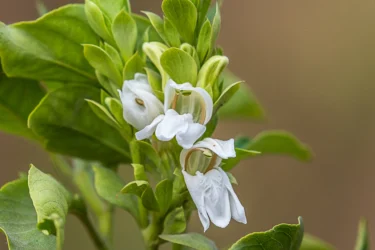
It is also known as Vasa in Sanskrit and Malabar Nut in English. The vasaka leaf decoction/tea helps in widening or opening up of the tubes in the airway and easing breathing. Thus, it is used for treating breathing problems. It is used as a remedy by people for wheezing due to lung issues. The leaves of vasaka can be used to make a decoction and be consumed. To counteract the bitterness, sugar or honey can be added to the decoction2.
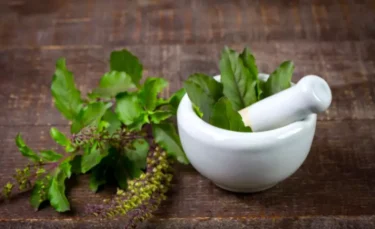
In many Ayurvedic cough syrups, tulsi is a common ingredient. In conditions like bronchitis and asthma, mucus gets stuck in the airway tubes and blocks them partially tulsi helps in moving the mucous, thus clearing the blockage. We can make a decoction using the leaves of tulsi, along with some ginger and honey and enjoy it at the end of a long day. This remedy provides relief in case of bronchitis, influenza, cough, cold and allergies, which may be the reason for wheezing2.
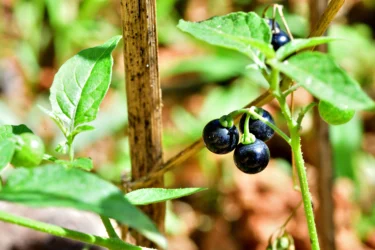
This is also known as Janglibhata in Hindi and Brihati in Sanskrit. In the preparation of cough syrups, it is one of the main ingredients used. It functions by thinning the mucus that is responsible for blocking the airways. Owing to this function, it is helpful when wheezing occurs due to inflammation of bronchus and trachea due to infection by bacteria (bacterial tracheobronchitis)2. It can be used as a remedy by using the leaves of nightshade to make a tea or decoction and drinking it.

Ginger or adrak is medicinally extremely valuable, especially the rhizome. It is used in reliving many conditions. For the treatment of asthma, a common cause of wheezing, a little bit of ginger juice with pomegranate juice and honey can be consumed. A decoction made by boiling ginger or ginger powder in water and adding honey can be useful in soothing the throat when we have allergies, which is another common cause of wheezing. Thus, ginger can be used in various preparations to relieve wheezing2.
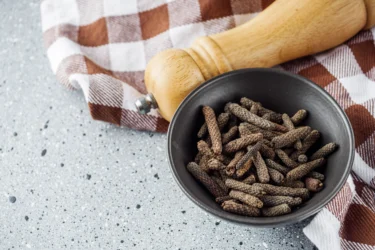
Pipli is the Hindi name of Long Pepper. It is also referred to as Chapla in Sanskrit. The fruit of this tree is of medicinal value. Asthma is a common reason behind wheezing and Pipli can be used to relieve Asthma, thus also an effective wheezing treatment. A little bit of the dried powder of pipli can be consumed along with jaggery. It can be consumed twice in a day, after food, for receiving its beneficial effects2.

Mulethi is also known as liquorice in English. When wheezing is the cause of bronchial asthma, or due to any other irritation caused in the bronchus, mulethi can be used in the form a tea to relieve it. An herbal tea can be made using mulethi and ginger, this tea can be sipped to feel relief from wheezing. However, it is advised not to drink more than 2-3 cups of this herbal tea in a day2.

Breathing exercises help in expanding the lung and increasing the lung capacity by relaxing our airways. Pranayama is a yoga form of breathing exercises. Practicing Pranayama or any other deep breathing exercises may be helpful in relieving wheezing. It is advised to practise these exercises in a moist environment to gain more benefits1.
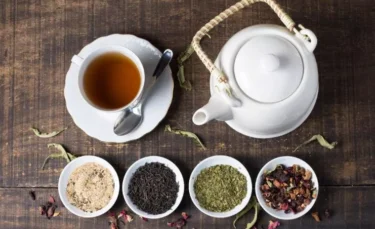
Drinking hot herbal tea provides relief to the throat and helps in relaxing the blocked air passages. This may be due to warmth and moisture of the herbal tea. Green tea is also said to have antibacterial properties, which might have an added advantage. Therefore, drinking hot herbal tea can be a delicious way to overcome your wheezing1.
All these home remedies can be used to limit the severity and control the wheezing, but when there is a severe excerbation it’s always important to take inhalers
Dr. M.G. Kartheeka, MBBS, MD(Pediatrics)
Also Read: How to Avoid Asthma Attacks During Winter
You should contact a doctor if you notice wheezing for the first time, if it keeps returning, or if you notice any of the following:
Wheezing associated with fever and cough should be examined by a physician to diagnose the underlying cause as if left untreated it may be a cause of pneumonia and may cause long-term damage to the lungs in the form of scarring of the airways.
Dr. Ashish Bajaj, M.B.B.S., M.D. in Clinical Pharmacology and Toxicology
Wheezing is an indicator of an underlying medical condition and it is not the kind of music that you want to hear. As there can be a number of reasons responsible for wheezing, it is advisable to consult a doctor and identify its exact cause. It can be due to allergies, cold and cough or can be the indicator of heart diseases as well. It can be uncomfortable and irritating. You can try out ginger, mulethi, tulsi, etc., which might be effective wheezing home remedies. Ensure you do not ignore severe wheezing or symptoms that are worsening and consult a doctor for wheezing treatment.
Also Read: 6 Simple Exercises to Improve Your Lung Health
No. The whistling sound that you hear while breathing is called wheezing and it can occur due to certain underlying conditions like asthma, allergies, bronchitis, etc. when our airway is partly blocked1.
Yes. Wheezing can occur due to allergies, due to blockage of a part of the tubes in the airway. It can also be cause due to bronchitis, smoking, asthma, etc1.
No. There are no reports of wheezing being caused by arthritis.
Yes. Ginger can be used to make a decoction with honey and pomegranate juice, is helpful in reliving asthma and wheezing caused due to it. It can also be used to relieve cough and soothe the throat, which might also relieve wheezing2.
Yes, Brihati is the Sanskrit name for black nightshade. It is beneficial in the treatment of wheezing caused due to inflammation of bronchus and trachea2. We can make use of the leaves of brihati to make a decoction and drink it to gain relief from wheezing.
No. There are no reports of wheezing being caused by kidney disease.
1. Cleveland Clinic. What is wheezing? [Internet]. Clevelanad clinic,ohio. [cited 2022 May 13]. Available from: https://my.clevelandclinic.org/podcasts/health-essentials/simple-ways-to-stop-wheezing
2. Dash Gyanesh , Mohanty KT Kumar Goura Ranjan , Sahoo Diptiman MG and PS. Traditional medicinal plants used for the treatment of asthma in Bhubaneswar, Odisha. Int J Herb Med [Internet]. 2018;12(3):27–40. Available from: https://www.researchgate.net/publication/328630427_Traditional_medicinal_plants_used_for_the_treatment_of_asthma_in_Bhubaneswar_Odisha
Disclaimer: The information provided here is for educational/awareness purposes only and is not intended to be a substitute for medical treatment by a healthcare professional and should not be relied upon to diagnose or treat any medical condition. The reader should consult a registered medical practitioner to determine the appropriateness of the information and before consuming any medication. PharmEasy does not provide any guarantee or warranty (express or implied) regarding the accuracy, adequacy, completeness, legality, reliability or usefulness of the information; and disclaims any liability arising thereof.
Links and product recommendations in the information provided here are advertisements of third-party products available on the website. PharmEasy does not make any representation on the accuracy or suitability of such products/services. Advertisements do not influence the editorial decisions or content. The information in this blog is subject to change without notice. The authors and administrators reserve the right to modify, add, or remove content without notification. It is your responsibility to review this disclaimer regularly for any changes.
Pneumonia is an infection of the lungs. It can occur in one or both of the lungs. It is a severe form of infection and can be caused by bacteria, viruses or fungi. In pneumonia, the lungs are filled with pus and fluid1. People of all age groups can contract pneumonia, but children aged four years and below, along with the elderly, are more prone to pneumonia2.
If you feel like you might have pneumonia, you should contact your healthcare provider immediately. A severe type of pneumonia may require hospitalisation. You will need diagnostic tests to confirm whether you have pneumonia3. Based on the diagnosis, your doctor will prescribe a treatment3. However, there are some remedies that you can follow to get relief from the symptoms of pneumonia, but these remedies should be used as supportive therapy and not as a stand-alone treatment.
Pneumonia can be caused by bacterial, viral or fungal infections. Bacterial pneumonia is the most common type of pneumonia. You might develop bacterial pneumonia after you have contracted viral infections like flu or cold. Viral pneumonia is mostly mild and gets corrected on its own after a few weeks. But sometimes, it can be serious enough to require hospitalization. Fungal pneumonia is often seen in people with a weakened immune system or people with long-term medical conditions3.
If you are pregnant and develop pneumonia, consulting a physician is very critical as it may harm the fetus and the mother as it reduces the flow of oxygen and may be a cause of premature birth.
Dr. Ashish Bajaj, M.B.B.S., M.D. in Clinical Pharmacology and Toxicology
Symptoms of pneumonia include:
The symptoms of pneumonia may vary from mild to severe in different age groups. Some infants and newborns may not show any signs of infection. While some might show signs of vomiting along with cough and fever. Older people may show milder symptoms along with fever3.
Most people affected by pneumonia will be able to stay at home and undergo treatment. The home remedies mentioned below might help you with the symptoms of pneumonia.

Getting rest is very important in pneumonia. Taking plenty of rest will help you to recover from pneumonia. Also, as you are taking a rest, you should try to sit up more than lying down. Sitting up will help you to feel better2.

You can try increasing your fluid intake to help you recover from pneumonia. Drinking plenty of fluids is very important for pneumonia2. It will help to prevent dehydration and also help to aid in your recovery. Water plays a huge role in our health.
You can use the herbs mentioned below to get relief from the symptoms of pneumonia. These herbs will help you to get rid of the cough and help you breathe easy.
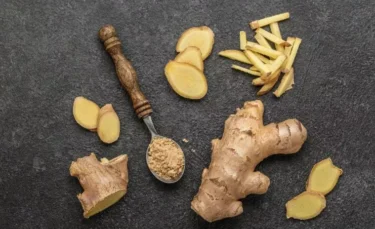
Ginger is beneficial in many respiratory problems, including cough. Ginger is a widely used natural remedy for cough. There are several ways to use ginger.
You can crush some fresh ginger, add it to water and bring the water to a boil. This ginger water can be taken several times a day to relieve coughing and chest congestion. Ginger can also be taken in combination with Tulsi leaves. Take crushed leaves of Tulsi, mix them in ginger juice and add honey for the taste. You can swallow this mixture to relieve the cough4.
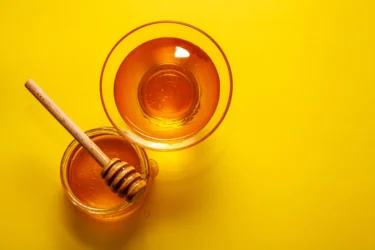
Honey is an effective cough remedy. Drinking hot milk with honey can help to get rid of dry cough and relieve chest pain that might arise due to constant coughing. Honey is easily accessible, which makes it a viable option4.
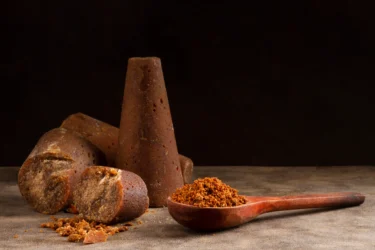
Jaggery is an effective remedy to relieve cough as well as chest congestion. It can help in expelling the sputum built up in the lungs and providing relief from the feeling of congestion in the entire respiratory tract. To use jaggery, you can boil some jaggery with pepper and add some cumin seeds. Drink this mixture to get relief from symptoms like chest congestion4.
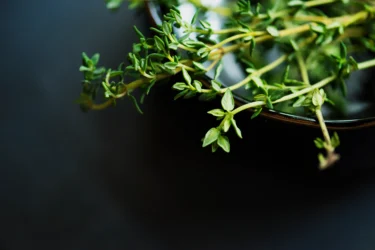
Thyme leaves are good for respiratory problems. The essence extracted from the leaves helps to manage cough and bronchitis (inflammation of the lining of the bronchial tube, which carries air to and from the lungs). Thyme leaves also contain flavonoids that have many health benefits. They relax throat muscles and reduce swelling. You can easily prepare thyme tea at home. Thyme tea is prepared by taking crushed leaves and boiling them with water. Let it rest for some time to steep all the essence. Drinking this tea helps to relax the lung muscles and open the airways4.
Breathing excercise like pranayama is important in recovery phase to improve injured lung capacity.
Dr. M.G. Kartheeka, MBBS, MD(Pediatrics)

Grapes can help in releasing the mucus from the affected parts of the respiratory tract. You can eat grapes to get their benefits. Another way of using grapes is making some fresh grape juice. You can drink this grape juice to help clear out the mucus. You can also take this grape juice with honey to enhance its effectiveness4.

Cayenne pepper or red pepper is an effective remedy for cough. It also reduces the chest pain associated with continuous coughing. Cayenne pepper can be used along with ginger, honey, apple cider vinegar and water4.
Also Read: Home Remedies For Viral Fever
Pneumonia is a respiratory infection that can become severe and in some cases, it can also become fatal5. If you notice any symptoms of pneumonia, contact your healthcare provider immediately.
Also Read: Home Remedies For Mosquito Bite By Dr. Siddharth Gupta
Pneumonia is a lung disease that can be caused by bacteria, fungi and viruses. Pneumonia can be mild or serious, depending on the cause. In pneumonia, one or both of the lungs get filled with mucus and fluids, which cause symptoms like breathlessness and chest pain. Most cases of pneumonia might require people to stay at home. You can use home remedies like ginger, jaggery, honey and thyme to get relief from the symptoms. Drinking plenty of fluids and taking rest can help you to speed up your recovery. If you notice any symptoms of pneumonia, seek medical help immediately. First, it is important to get the necessary diagnosis. Your doctor will prescribe a treatment based on your diagnosis.
Also Read: Simple Home Remedies for Sneezing
Some remedies can be used to ease the symptoms of pneumonia. Ginger, thyme, cayenne and honey can be used to relieve cough and congestion. You can also use jaggery to help with the cough4. You also need to take plenty of fluids to aid in your recovery2. It is advised to follow up with the doctor for treatment of pneumonia.
While viral pneumonia may improve on its own with time, bacterial and fungal pneumonia require timely medical attention. Also, you need a proper diagnosis to confirm pneumonia3. Pneumonia is a lung infection that can become severe, if not treated timely5. Therefore, it is important to consult with your doctor and get the necessary diagnosis and treatment.
Yes, pneumonia is a severe lung infection that requires timely medical intervention. Pneumonia, if not treated in time, can become fatal5. If you notice any signs or symptoms of pneumonia, contact your doctor or healthcare provider immediately.
Pneumonia is a lung disease that is caused by bacteria, viruses or certain fungi. Bacterial pneumonia is the most predominant form of pneumonia3.
Viral pneumonia can get better with time on its own3. But, you should consult with your doctor to get a proper diagnosis based on your symptoms. If you notice any symptoms of pneumonia, contact your doctor immediately.
Most cases of pneumonia respond well to the treatment. But pneumonia can have severe and even deadly complications. The risk of developing such complications is high in the elderly, young children, people with a weak immune system and people who have cirrhosis or diabetes. The complications involve respiratory failure, lung abscesses (swollen areas containing pus) that might require surgery and sepsis (infection reaches the blood)1.
1. Johns Hopkins Medicine [Internet]. Pneumonia; [cited 2022 May 17]. Available from: https://www.hopkinsmedicine.org/health/conditions-and-diseases/pneumonia
2. Better Health Channel [Internet]. Pneumonia; [cited 2022 May 17]. Available from: https://www.betterhealth.vic.gov.au/health/conditionsandtreatments/pneumonia
3. MedlinePlus [Internet]. Pneumonia; 2021 Jun 20; [cited 2022 May 17]. Available from: https://medlineplus.gov/pneumonia.html
4. Sultana S, Khan A, Safhi MM, Alhazmi HA. Cough Suppressant Herbal Drugs: A Review. Int J Pharm Sci Invent [Internet]. 2016 Aug [cited 2022 May 17];5(5):15-28. Available from: https://www.researchgate.net/publication/308369657_Cough_Suppressant_Herbal_Drugs_A_Review
5. American Lung Association [Internet]. Five Facts You Should Know About Pneumonia; 2020 Oct 23 [cited 2022 May 17]. Available from: https://www.lung.org/lung-health-diseases/lung-disease-lookup/pneumonia/five-facts-you-should-know
Disclaimer: The information provided here is for educational/awareness purposes only and is not intended to be a substitute for medical treatment by a healthcare professional and should not be relied upon to diagnose or treat any medical condition. The reader should consult a registered medical practitioner to determine the appropriateness of the information and before consuming any medication. PharmEasy does not provide any guarantee or warranty (express or implied) regarding the accuracy, adequacy, completeness, legality, reliability or usefulness of the information; and disclaims any liability arising thereof.
Links and product recommendations in the information provided here are advertisements of third-party products available on the website. PharmEasy does not make any representation on the accuracy or suitability of such products/services. Advertisements do not influence the editorial decisions or content. The information in this blog is subject to change without notice. The authors and administrators reserve the right to modify, add, or remove content without notification. It is your responsibility to review this disclaimer regularly for any changes.
Next Page »« Previous Page